David Bohm - on Meaning, Purpose and Exploration in Dialogue
(Extracted from a webpage - see below - where it had been edited with permission from tapes of an August, 1990 conversation)
Communication has been ailing in the human race for a long time and Dialogue is concerned with that. But the primary purpose of Dialogue is not to communicate. It is much deeper. It addresses the blocks in communication, not merely to understand them, but to meet them directly. It is aimed at seeing resistances to communication. In Dialogue we are ready to raise topics serious enough to cause trouble. But while we are talking we are interested in being aware of what's going on inside us and between us.
The word "dialogue" has many meanings and we are giving it a particular meaning. In this Dialogue we are not trying to make our points prevail or, if we are, we need to look at that. Our challenge is to see when each of us is trying to prevail, because if anybody prevails it means the dialogue has failed. Or, if we simply agree, the dialogue may also have failed because this means that we haven't gone deeply enough into the process or into the consciousness behind it. What begins to transform culture into something quite different is that ultimately the frustration or anger or rage or hatred that arises can lead to a crisis in which these feelings are transformed giving rise to impersonal fellowship - to thinking together and participating as if we were one body - by establishing a common consciousness. The group then becomes a kind of instrument of consciousness which can function differently.
It is essential to state the theory that this is what is possible. What I am saying is that a particular kind of dialogue is needed. But, as we talk together the question of what, if anything, its purpose is keeps arising. Sometimes we say that it should not have a purpose and sometimes we seem to say that it should. If we restrict the purpose too much it is clear we are going to be in trouble. None of the purposes is fixed because we find that as we go further into it the purpose begins to change; we discover a new purpose, and so on. So really, when we set a purpose, we set it only as a beginning, as a point of departure, not as a purpose we hold to. This is the crucial point. We may at any moment have to have a purpose, but we are not holding to that purpose. Purpose flows out of significance and value and that's what we're exploring. We expect that meaning is going to change through our learning as we go along and therefore purpose changes naturally.
In Dialogue or in our own meditation, or whatever, the attitude is one of exploration and emptiness - that is, not having fixed assumptions but rather an empty space where there is the possibility of exploring all sorts of things. This is a proposal for exploration. But even this is not final. It too has to be constantly open to exploration - seeing whether the proposal, as made, is coherent. In other words, we're not even saying exploration is the answer. The purpose is constantly changing and flowing out of the meaning.
But we can't give the meaning in a nutshell. If everybody knew the meaning, we wouldn't need the Dialogue. The dialogue is not aimed at settling anything. We explore meaning together - the creative perception of meaning - thinking together and feeling together. But meaning is active. It is not merely sitting there. The consideration of this meaning may act - or it may not. The whole point of having the Dialogue is that we're not trying to produce a result. That's very important. It may never do it. Or it may do it at some moment when we least expect it. The seed has been planted. And the meaning is naturally, spontaneously active and transformative.
http://www.david-bohm.net/dialogue/dialogue_exploration.html
Copyright © 1990 by Sarah Bohm
Use only with prior permission.





